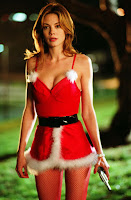Okay, time for a personal confession.
I am a geek. Long time nerd. I was one of those sci-fi/ fantasy/ comic-book weirdoes long before most of you reading this were born. An outcast all through grade school and high school with only a few equally geeky friends.
I saw Star Wars in the movie theater when it was just Star Wars. None of this tacked-on- “Well, I always planned a trilogy of trilogies”- A New Hope nonsense. I remember when the Doctor turned into a tall guy with curly hair and a scarf, back at a time when you knew Daleks were supposed to be scary but couldn’t quite figure out why. I devoured the tales of Hawk the Slayer, Rom the Spaceknight, and John Carter, the Warlord of Mars. I remember the X-Men when they weren’t cool and Wolverine dressed in bright yellow spandex. Heck, when I learned how to play Dungeons & Dragons it was just two magazine-sized paperbacks with red and blue covers. It was a proud, thrilling moment for me when I first found out I was going to work on a Beastmaster movie (the shame came later).
Alas, sci-fi and fantasy get a bum rap from most folks, and those two genre tags are often seen as a kiss of death by agents, publishers, and studios. Heck, producer Ron Moore went out of his way to keep people from calling Battlestar Galactica sci-fi, despite that glaring network label. Michael Crichton’s Jurassic Park was almost never shelved in the sci-fi/ fantasy section. Same with his Eaters of the Dead and all those Harry Potter books.
What years of digesting this stuff have shown me, though, is a lot of bad genre stuff tends to be bad for all the same reasons. Oh, there are some films and books that have found bold and daring ways to be awful no one could’ve possibly thought of (for examples of this, I recommend the novel Einstein’s Bridge and/or the film Women of the Prehistoric Planet), and there are a lot of the same basic problems you’ll see in any story or script, but overall the lethal genre flaws tend to fall into three categories.
One of the biggest mistakes I see in a lot of genre stuff is writers who are trying to make it too amazing. They cram in everything they can think of, every idea they have. It’s a bit like when that one overeager kid got to be the Dungeon Master for the first time and created that dungeon with fifteen platinum dragons and twenty giant purple worms and thirty minotaurs armed with +5 flaming swords and every door had a poison needle trap and… and… and…
I read one sci-fi screenplay a while back that dealt with a character awoken from cryogenic suspension thousands of years in the future, superhuman bio-technology that let people live at an accelerated rate, the different physics reactions this accelerated rate caused, gladiatorial games, social clans, an arms race, interplanetary civil wars, and an ethical debate over cloning. These weren’t just touched on, mind you, but all were essential, key elements in a 100-odd page script.
The problem with writing screenplays or stories like this is your audience has nothing left to latch onto as they’re overwhelmed with everything that’s different. The location is different. The rules are different. The people are different. Motivations are different. The writer may have created the most unique 37th Century world ever, but the audience needs to be able to understand to it now.
This leads us right into problem two—when the writer tries to explain all of it. I think most people reading this have seen a story or script that suddenly deviates into exposition. Characters will suddenly spout out a page or three on what the fabled Amulet of Sativa can do once it’s soaked in the blood of an innocent or how space travel works. Worse yet, sometimes this explanation will just pour out between the dialogue as the writer talks directly to his or her audience.
What this leads to is stories that are phenomenally detailed and exotic, but nothing ever actually happens in them. Five pages explaining why the Cawdor hive-gang has hated the Escher hive-gang for the past twenty years is really just five pages of characters sitting around twiddling their thumbs.
And this leads us to big problem number three—when the writer doesn’t explain any of it. Strangers make ominous proclamations. Disturbing photos arrive in the mail. Eerie carvings of strange, vaguely-familiar symbols are found on the wall. And people don’t address or flat-out ignore all these odd things.
A lot of the time, in my experience, this is a desperate attempt to create an aura of mystery and amazement around the characters or events when there really isn’t anything mysterious or amazing there. The writer just watched a lot of episodes of LOST or Fringe or maybe just the Matrix one too many times.
So, how can you beat these problems? How can you prove to editors, agents, and readers that your genre work is true literature and not at all like the feeble attempts of these other fanboy hacks who’ve been encouraged by their geek friends?
(Apologies to all my geek friends—I wasn’t talking about you.)
For that first problem, have a touchstone. Make sure your story has a main character your audience can immediately relate to. A protagonist who hates their job. Somebody lusting after someone they can’t have. Someone who feels like an outsider. Simply put, a person who has a universal need or desire. I’ve mentioned once or thrice that believable characters make for believable stories, and that’s especially true here in the genres. Luke Skywalker was a small-town boy who didn’t want to go into the family business. John Carter was a Civil War veteran from Virginia trying to find a purpose after the war. Ellen Ripley was the second in command of a mining ship who just wanted to get home to her daughter. Once the reader can believe in your characters, they can believe in what’s happening to your characters. This is a large part of Stephen King’s success, that 95% of his stories involve absolutely ordinary people living absolutely ordinary lives. By the time clowns crawl out of the sewers or a wall of mist rolls across the lake, the reader’s already invested in those folks. We believe in the characters, so we have to believe in what’s happening to the characters.
There are two things you can do for the second problem. One is to trim out anything that doesn’t need to be there. You may have the coolest take on vampires ever, but if you’re only including the vampires because you’ve got this cool take, yank them out and have your characters get attacked by bandits. It’s really cool that you’ve created the entire history and art of the nidhar, an ancient short-range weapon consisting of an array of blades that are held one between each finger before releasing them… but couldn’t your character get by with just a throwing knife?
Here’s a helpful example. Isaac Asimov once wrote a clever short story called “Nightfall,” later expanded to a novel of the same name. In the preface, he explains that he uses miles, hours, and years not because his planet is related to Earth, but because he saw no point in overcomplicating the story. If it works for the master…
The other thing you can do is fall back on the ignorant stranger method I’ve mentioned a few times. It’s nifty that taxicabs and busses are all electric and run by robots at this point in the future—but doesn’t Yakko already know that? I mean, he’s from the future, right? Shouldn’t Lord Murrain already know why he sent his henchman, Wakko, off to search the arctic wastes for a year (to search for the legendary Ice Sword)? Why does Wakko need to explain where he’s been? If this material isn’t vital to your story, trim out that paragraph or three of exposition and just trust that your readers are smart enough to understand future taxis are cool and Wakko found that which he sought.
To solve that third issue, make sure you know what you’re keeping secret, and that it really is a secret. Nothing will frustrate your audience more than to struggle and stumble through a whole story and then realize the writer has no intention of revealing the big mystery, or that there really isn’t one. Figure out what the story’s secret is and work backwards, making sure characters are motivated to hide it and/ or smart enough to uncover it.
Here’s a fun little tip I once heard from that nice lady over at A Buck A Page. Your main character should mirror your audience. So if your main character is constantly saying “I don’t understand,” or “What does that mean?” it probably means your audience is, too. Or, worse yet, they already hate your main character for being a $#&%ing idiot and threw your work across the room fifteen pages back. This also gives you a great guideline, though, of when stuff should be revealed. If you’re well into the third act of your tale and the main character still doesn’t have a clue what’s going on… well, I’m sure a few of the readers will keep reading to the end. Three or four of them, at least…
And that’s all I’ve got for you, unless anyone wants to debate Shogun Warriors vs. Micronauts. Hopefully this’ll help get some more good genre stuff out there for eager audiences.
Next time, just for fun, let’s kill a few babies.
Until then, get back to writing.
 Or maybe your detective plays it cooler than mine and just stands there with her hands in her trenchcoat. Maybe she gives a little nod and a faint smile when the murderer gets hauled away. And then she pulls out her flask and crawls deep inside until she can re-bury all those memories about Jenna that this case dragged up again…
Or maybe your detective plays it cooler than mine and just stands there with her hands in her trenchcoat. Maybe she gives a little nod and a faint smile when the murderer gets hauled away. And then she pulls out her flask and crawls deep inside until she can re-bury all those memories about Jenna that this case dragged up again…



